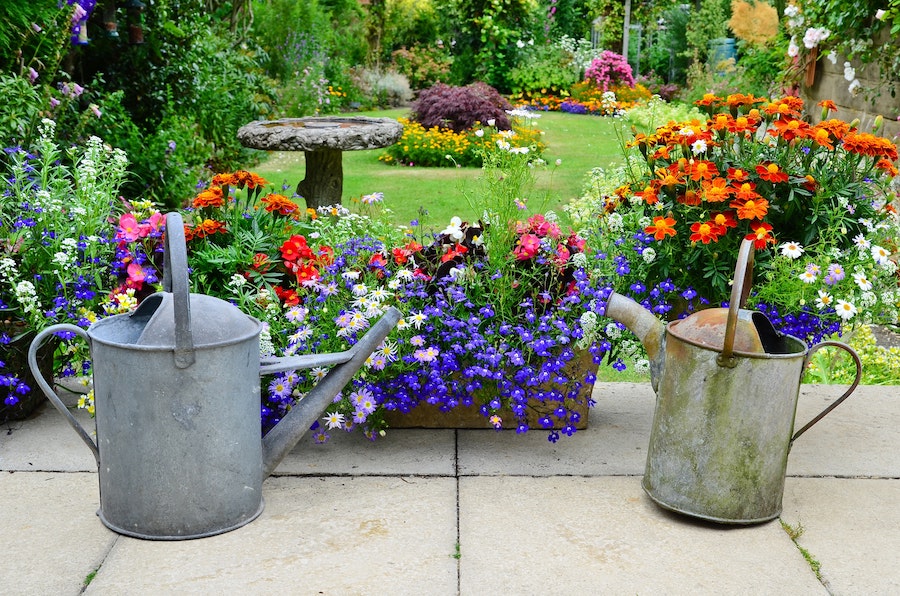Mind the gap: How to fill your garden borders when spaces appear in summer
As early lupins, cranesbill geraniums and other early-summer-flowering perennials fade, how are you going to fill the gaps in your borders?
Giving some spent perennials a good haircut may help a second flush of blooms, but these are seldom as impressive as the first flowers, so it’s good to have a few fillers waiting in the wing.
Use existing patio pots

Verbena in a pot can fill a gap with colour
If you’ve grown something beautiful in a pot which is still going strong, consider placing the pot in a spare place in the border.
This year I plugged a gap in the middle of the border, where some height was needed, with a clematis I already had in a pot, climbing over a wigwam of bamboo canes. Just placing the pot on the soil already gives you additional height.

A pot can be hidden in a gap, leaving a climber to fill the space
Alternatively, if you have an excess of patio pots bursting with annual colour, but which are starting to get in the way, brighten up your borders by plugging the gaps with a couple of them, which will not only add a splash of colour where it’s needed, but will also give you more space for entertaining.
Add flowering perennials and tender showstoppers

Perennial phlox makes a colourful stop-gap
Visit your nursery or garden centre to see what’s in flower now and is likely to remain so for at least a few weeks, until your late-summer flowers – including crocosmia, asters, heleniums and rudbeckias – reach their peak.
I love perennial phlox, which in my garden have just come into flower and usually last a few weeks. They come in a wide range of colours and should be in flower in garden centres now, so just choose which colour goes with your scheme.
If you have a shady spot, hostas are good fillers, their tropical-looking leaves creating an exotic feel to a cool area, producing spikes of blue or white flowers in summer.

Hostas make great fillers in shady spots
Just make sure you keep them well-watered until they’re well established, and be vigilant against slugs and snails, who will feast on the leaves if you let them.
Give tender candidates a space

Canna lilies create sizzling colour in a border
If you want wow factor, consider canna lilies, whose large tropical-looking leaves unfurl to reveal truly showstopping flowers in shades of red, orange, yellow and pink.
Again, they should be in flower now at your local garden centre, so select your colour and plant them between low-growing shrubs.
Cannas are tender, though, so if you plant them in the ground the rhizomes will need covering with a thick mulch over the winter, and if you live in a cold spot you may lose them. I’d go for container-planting, then you can move them to a more sheltered, frost-free place over the winter, such as a greenhouse or conservatory.

Lobelia ‘Queen Victoria’ makes a showstopping scarlet filler
Perennial lobelias are also a good bet for the border. They’ve very different to the bedding lobelia you buy at this time of year, as they are tall (up to 36in/90cm), elegant plants producing striking flowers in pink, red or purple.
Among the best is L. ‘Queen Victoria’, which bears scarlet flowers on beetroot-coloured stems and is ideal for planting alongside yellow rudbeckia, which will flower before the lobelia has finished.
Just make sure you plant it in moist, fertile soil and keep it well watered. In winter, it will need covering with a thick mulch – and cross your fingers that it will come back.
If you have gaps in a narrow border, linaria (purple toadflax) is an easy perennial which will keep flowering until September, producing tiny, snapdragon flowers on slender spikes above tall, grey upright stems.

Linaria can plug gaps in narrow borders
It’s ideal for filling gaps in the middle or back of a narrow border, as it grows to around 30in (76cm), but be warned that it self-seeds freely, so may appear in other parts of your garden in subsequent years.
Don’t forget annuals

Annuals like pelargoniums make instant colourful fillers
So, here you’ll have masses of choice, from tall cosmos, which produce showy daisy-like flowers throughout summer and into September, to pelargoniums, zinnias and verbenas.
If you have an alpine garden or rockery which has started to look a bit colourless, try planting a couple of trailing pelargoniums to perk it up. They should withstand drought and enjoy being in full sun.
At this time of year, garden centres will be selling multi-packs of annuals so these are ideal for a colourful quick-fix and will already be in flower.
Other good fillers include patio dahlias which you can add to the front of the border. They tend to be compact, growing only up to around 30in (76cm) tall, so are easy to slot in and should be in bloom now, so you can select the colours you want.
The Press Association
Latest posts by The Press Association (see all)
- The best ways to boost your immune system as cold temperatures hit - January 5, 2025
- The Osmonds star and ‘beloved husband and father’ Wayne Osmond dies aged 73 - January 2, 2025
- What screenings are available on the NHS to detect cancer early? - January 2, 2025
- Help your grandchildren make the most of Big Schools’ Birdwatch - January 1, 2025
- Veteran radio star Johnnie Walker dies aged 79 - December 31, 2024




















